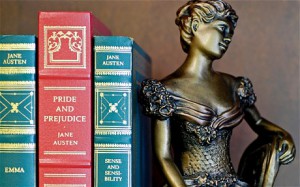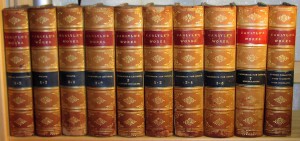How Politics Changed Literature In The Nineteenth Century?
In the history of Western Europe, nineteenth century is one of the most eventful and innovative periods. Undoubtedly, it brought a revolution to the future development of the world and completely changed the course of history. Numerous researches on politics and literature of the nineteenth century focus on separate analyses of these spheres and conclude that literature shaped and influenced politics. However, there is little attention given to investigate the interdependence of politics and literature. Therefore, the question whether literature of the nineteenth century was one of the key factors that formed politics is still a matter of high controversy. While many may argue that “philosophy, literature, and art … influenced the cultural, social and political movements” (The State Council of Educational Research and Training, n.d.), there is much evidence that it was politics that changed literary movements and led to the development of romanticism and, to a smaller extent, realism.
Romanticism emerged and developed as a reaction to social changes introduced by the French Revolution and as a counter reaction to the Industrial Revolution. Also, it originated in the late eighteenth century as a response to rationalistic classicism and the Age of Enlightenment. The philosophical basis of Romanticism was formulated by Immanuel Kant. According to him, the real world was a mental reconstruction, the ideal world. This idea was called Idealism or Romanticism. The emphases of Romanticism were primacy of the individual, feeling and inspiration, subjectivity, imagination, free expression, communion with nature, and the idea of the artist was as visionary genius (Sporre, 2013). Prior to Romanticism, writers focused on eulogizing the absolute monarchy and describing the life of the aristocracy. One reason for this was ideological and political censorship that did not allow undermining the authority of the ruling class. Therefore, hardly any attention was paid in literature to the life of ordinary workers. However, the beginning of the French Revolution provided writers with the footing to unleash their new ideas. The role of the revolution is briefly described by Hancock: “It [the Revolution] was hailed with joy and acclamation by the oppressed, by the ardent lovers of humanity, by the poets, whose task is to invoice human spirit” (Hancock, 1899). Writers were given freedom of expression both in forms and themes. Romanticists focus on describing ordinary individuals – with all emotions and feelings natural to humans. Furthermore, many works are written in plain language in order for the working class to read it. The flipside reason for the emergence of Romanticism is also the Industrial Revolution. Numerous political actions directed at introducing technologies were perceived by Romanticists with outrage. Thus, the vast majority of works appeal to the harmony between humans and nature.
Colonial politics of the Western Europe also boosted the development of Romanticism. The nineteenth century witnessed numerous expeditions along Africa and Asia. Because European countries were supreme in that time world, it was of no difficulty for them to colonize new countries and nations. New traditions, species of flora and fauna added exotic elements to the works of romanticists and became subjects to myths, mystics and magic that romanticists were attracted to. For the vast majority of Western Europeans, Indian elephants or Egyptian palms were exotic – that is not typical of their culture. By introducing these elements, writers brought “exoticism” into their works. Similarly to portraying people from the distant past, romanticists created images of remote places. Usually, such works with elements of exotics depicted colonizers as lazy while local people were described as more intelligent and more interesting.
The second literary movement of the nineteenth century, Realism, is also a direct result of that time politics. However, Realism emanates from the Industrial Revolution and scientific advancement. Although the Industrial Revolution started in the eighteenth century, its real effects became clearly visible only in the second half of the nineteenth century. Politics towards technological progress, which was perceived as a key towards the development of a country, relied on rational and scientific footing. Because the role of machines had been gathering momentum, human abilities became more underestimated and trivialized (Darrow, 2010). The exact calculations and descriptions were needed which left no room for imagination. Furthermore, Darwin’s Theory of Evolution only reinforced the importance of science in everyday life. Therefore, the main principle of Realism was depicting the world as it was without utilizing any imagination. In addition, Realism avoided any emotional or exotic elements and revealed life of people of all classes in spontaneous rhythms not avoiding unpleasant situations. All of these trends could not but challenge romantic vision of literature and supersede Romanticism by Realism.
In conclusion, the development of literature in the nineteenth century is tightly connected to and dependent on politics. As a matter of prudence, politics was the key factor that influenced the existence of romanticism and realism. French Revolution allowed romantics freedom of expression and intensive use of imagination. Furthermore, colonization politics of Western Europe introduced exotic elements into Romanticism. On the other hand, being the result of the Industrial Revolution and scientific scrutiny, Realism rejected emotions and imagination and depicted world as it was.
References
Darrow, C. (2010). Realism in literature and art. Memphis, TN:General Books.
Hancock, A.E. (1899). The French Revolution and the English Poets: A study in historical criticism. Retrieved from https://archive.org/details/frenchrevolutio01hancgoog
Sporre, D. J. (2013). Reality through the arts (8th ed.). Upper Saddle River, N.J.: Pearson Prentice Hall.
The State Council of Educational Research and Training. (n.d.). Intellectual trends of the 19th and 20th centuries. Retrieved from http://www.scert.kerala.gov.in/images/text_books/unit%2006.pdf
You’ve read a literature essay sample that demonstrates how an academic paper should be written. However if you can’t handle essay writing, get help from MyPaperforMe.com. With our help, you can forget about your worries as our writers are professionals in academic writing. All you have to do is to place an order on our site including all your requirements and setting the deadline.



